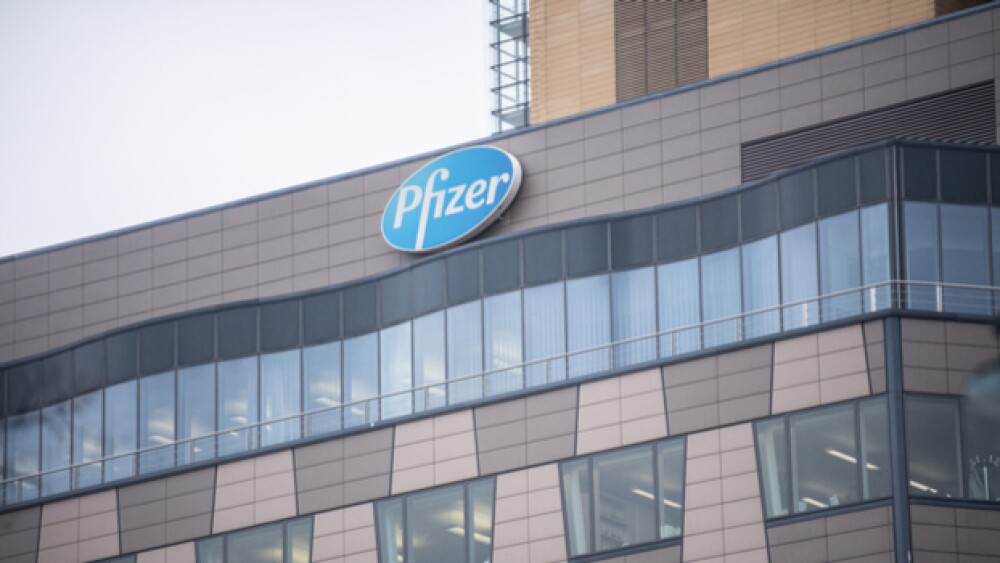For 2018, Pfizer reported revenues of $53.6 billion, which was 2 percent operational growth. The fourth quarter brought in $14 billion, which was 5 percent operational growth.
Cineberg / Shutterstock.com
For 2018, Pfizer reported revenues of $53.6 billion, which was 2 percent operational growth. The fourth quarter brought in $14 billion, which was 5 percent operational growth.
But what appears to be getting attention is the company’s weaker forecast for 2019, projecting adjusted earnings per share of $2.82 to $2.92, below the average Wall Street analyst estimate of $3.04. The company is citing unfavorable foreign-exchange effects, which will decrease sales by about $900 million this year.
Bloomberg noted, “This outlook echoed guidance issued earlier this month by health-care bellwether Johnson & Johnson, one of Pfizer’s largest rivals. J&J said it expects growth to slow or grind to a halt this year as the dollar climbs against rival currencies and rising drug prices become a more central political issue in Washington.”
The area where Pfizer is booming is in the overseas markets. Its oncology segment climbed 53 percent overseas, while the oncology sales in the U.S. only improved 6 percent.
Only Monday, it was noted that Pfizer’s oncology portfolio is growing, but that until recently it wasn’t known for cancer drugs. It was far more prominent for primary care and cardiac drugs, like Lipitor for cholesterol, Lyrica for neuropathic pain and fibromyalgia, Zithromax for bacterial infections, and Viagra for erectile dysfunction.
But now the company has 17 drugs for cancer, with four approved in the U.S. in 2017. The oncology portfolio is projected to bring in $8.3 billion in sales this year.
Part of Pfizer’s woes includes loss of patent protection for Viagra and Lyrica. Eliquis is facing competition from J&J’s Xarelto. Lyrica brought in $1.32 billion in sales in 2018. Yesterday, Pfizer and Eli Lilly announced that their tanezumab hit two out of three co-primary endpoints in one dose and all three at a higher dose for pain due to osteoarthritis. Pfizer hopes this drug will replace Lyrica, as Lyrica loses its patent protection.
Ibrance brought in $4.1 billion for the year, an increase of 32 percent operationally. The company’s biosimilars business also grew 41 percent operationally. The company received two biosimilar approvals by the U.S. Food and Drug Administration (FDA) in 2018 and expects up to four more in 2019.
“We enter 2019 with confidence in the competitive positioning of our businesses, the prospects for our recently launched products and product line extensions, as well as the strength and breadth of our research pipeline,” stated Albert Bourla, Pfizer’s new chief executive officer. He took over on Jan. 1, replacing Ian Read.
Bloomberg writes, “Pfizer is facing a transitional period during which the company expects a group of new drugs to take the place of older blockbusters. The company’s innovative health segment, which includes new vaccines, oncology, immunology and rare-disease drugs, saw sales increase 10 percent in the fourth quarter. Meanwhile, revenue from a segment made up of legacy assets facing market exclusivity challenges fell 3 percent.”
Overall, Bourla appeared optimistic for the long-term growth of Pfizer, telling analysts at the company’s conference call, “We see the potential in 2019 for several inflection points that will further advance our pipeline. These include potential U.S. approvals for a combination of Bavencio and Inlyta for first line renal cell carcinoma as well as for up to four biosimilars, trastuzumab, bevacizumab, rituximab and adalimumab, which when taken together represent a potential blockbuster opportunity for Pfizer.”
He went on to say, “We believe we are extremely well-positioned for what we expect to become an era of sustained top-line growth with leverage to the bottom-line growth rate, following the impact of the Lyrica LOE (loss of exclusivity).”





